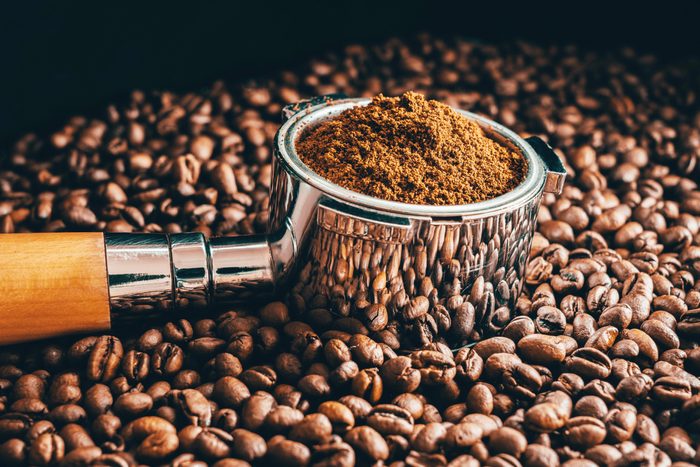How Much Caffeine Is In Coffee? Cleveland Clinic Experts Explain
Updated: Dec. 06, 2023

A doctor lists the types of coffee preparation and the average caffeine content for each. Turns out, decaf actually contains some caffeine.
If you’re like an estimated 70% of people around the world, that cup of coffee in the morning is an essential ritual, an almost spiritual way of jump-starting the day and clearing the fog of sleepiness.
Even the taste and aroma of coffee are pick-me-ups—but for many coffee lovers it’s that caffeine, coffee’s primary stimulant, that drives such loyalty to the drink. But how much caffeine is in coffee, giving you that elevated effect? Two Cleveland Clinic experts help grind out the facts.
Effects of caffeine from coffee
The buzzy effect of coffee starts from the first sip. Cleveland Clinic registered dietitian Beth Czerwony, MS, RD, LD, notes that caffeine takes 15 to 20 minutes to enter the bloodstream, and most coffee drinkers feel its full-on influence within an hour. That happens as caffeine fires up brain activity and stimulates the nervous system. (Possibly coinciding with what you consider your most productive window of the day!)
The benefits of caffeine from coffee include enhanced focus, heightened alertness, and even relief from persistent headaches for some.
Beyond the immediate perks, Donald Hensrud, MD, chair of the Division of Preventive, Occupational and Aerospace Medicine at the Mayo Clinic notes that recent research shows coffee might also offer protection against ailments like Parkinson’s, Type 2 diabetes, liver disease, heart attack, and stroke. We’ll tip our cups to that.
A 2022 study suggested that moderate caffeine consumption could potentially increase life expectancy thanks to lower heart risk, pinpointing the compounds in ground coffee as having the greatest effect.
Here’s how much caffeine is in different types of coffee:
While most of us don’t exactly measure our coffee before sipping, knowing the caffeine content can be eye-opening. Czerwony and Julia Zumpano, RD, LD, provide some figures:
- Standard brewed coffee: Approximately 85 milligrams of caffeine in an eight-ounce cup. However, depending on how strongly it’s prepared, this can range between 65 to 120 milligrams.
- Instant coffee: Typically around 75 milligrams per eight ounces, but it can vary between 60 to 85 milligrams.
- Decaf: Despite its name, it contains two to four milligrams of caffeine per eight ounces.
- Espresso: 64 milligrams of caffeine in just a one-ounce shot, per a Mayo Clinic guide.
In addition, brewing techniques can influence caffeine content. Extended brewing methods, such as the French press and cold press, often result in a higher caffeine concentration. “Cold press coffee requires 10 hours or more,” Czerwony highlights, so “pay specific attention to minimizing your intake of these kinds of coffee.” In other words, a nitro brew every morning and afternoon probably isn’t recommended.
The Different Types of Coffee—From Healthiest to Least Healthy
Here’s how much caffeine from coffee is too much
When it comes to daily caffeine intake, “it depends on individual tolerance,” advises Zumpano. Yet, she recommends not exceeding 400 milligrams per day—equivalent to three to five standard coffee cups, contingent on its type and brew.
If you notice caffeine causing restlessness or over-dependency, consider cutting back. Overindulgence, particularly above 480 milligrams daily, can be hazardous, warns Czerwony, with risks including arrhythmias (heart rhythm disturbances), cardiac ischemia (narrowing of the heart’s arteries), and in extreme cases, seizures or even fatalities.
7 Things That Happen to Your Body When You Drink Coffee Every Day
How to drink coffee safely:
It’s always wise to speak with your primary care provider before you make any change to your diet or routine. If you’re thinking about a caffeine reduction, have a medical condition such as pregnancy or a minor heart issue, or simply want to consume mindfully, Zumpano recommends a few points of dialogue to bring up with your doctor:
- Gradual reduction: Don’t quit coffee suddenly. Reduce your intake step by step to prevent withdrawal symptoms.
- Low-caffeine alternatives: Try decaf, half-caff, or perhaps a black or green tea.
- Opt for non-caffeinated: Stay hydrated with water, herbal teas, or indulge in 100% fruit or vegetable juices.
- Prioritize sleep: A good night’s rest diminishes the need for that caffeine boost. Aim for quality sleep to reduce dependency.
While caffeine can be a delightful and beneficial pick-me-up, it’s essential to consume it responsibly. As always: Know your limits, listen to your body, and make informed choices about your daily brew.
For more wellness updates, subscribe to The Healthy @Reader’s Digest newsletter and follow The Healthy on Facebook and Instagram. Keep reading:



















